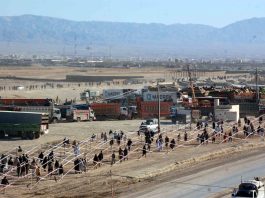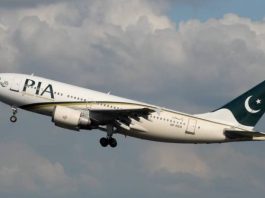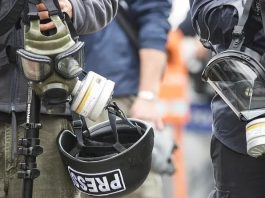TANK: There is a solitary church in the heart of South Waziristan Agency’s embattled headquarters of Wana where members of the small Christian community – undeterred by years long militant-linked violence – regularly offer their Sunday prayers.
The foundation stone of the church was laid by Absar Ahmed Minhas, former colonel of the South Waziristan Scouts (SWS), in deference to demands from Christians living within the military compound. There is a huge military presence in the Wana scouts camp, which is built during the British rule at the strategic location to tame the fiercely independent tribesmen.
Standing in what is locally called the lower camp, the church has a seven-foot-high boundary wall, with a cross seen atop the single-storey building. The top roof is made of tin, enabling the building to withstand heavy snowfalls. A hall-like room inside the Minster is made of specially made tent blocks.
With two gates, its lawn areas are equipped with steel benches that offer a panoramic view of the mighty, jagged mountains known as Sheesha Heights. Barring a small residential quarter of the bishop, no buildings could be seen in the vicinity. However, the Jamia Masjid or the central mosque is situated at a close distance with the Church, which presents a rosy picture of communal co-existence.
Work on the church started on January 24, 2000, in the presence of political administration officials and Christians.
Nazeer Alam, former Bishop and father of the incumbent Pastor, while talking to News Lens Pakistan, recalled: “Before the construction of the church, Christians used to worship inside a small stuffy room. Hundreds of Christians here in Wana were in dire need to have a proper worship place. We collected funds for the establishment of the church. Indubitably, our community has made a generous contribution to the noble cause.”
The house of worship is placed under the Gospel Pentecostal Church International (GPCI), according to the bishop Zeshan Alam, who received his religious education from the Theological School in Karachi.
A devout protestant with many qualities of heart and head, the soft-spoken cleric is an employee of the Frontier Constabulary – a paramilitary force with inadequate skills to fight the resurgent Taliban and terrorists plaguing the border region but the local community are known for respecting people of all faiths.
“We want religious freedom for all and sundry. We use to meet members of Christian community here and discuss with them their problems. They speak local language fluently. We demand the government to offer better education and other facilities to their kids to better serve the country,” a tribal elder Ali Wazir told News Lens Pakistan.
He said that there was no visible threat to Christian community living here and they have better understanding with locals. But another member of the minority community wishing to go unnamed said: “The biggest problem we’re facing this time is lack of land for our graveyard. We’ve put forward our demand to the local administration to allot us a land to bury our dead because our existing graveyard has no more space. Another problem, we’re confronted with is that most of our young are jobless.”
Alam, in his early 30s, told News Lens Pakistan that “We’re peace loving people and local tribal have good behavior with us. We have no security issue or any problem here.”
Earlier in September 2013, two suicide bombers equipped with hand grenades and pistols forced their way inside a Church in Peshawar, the provincial capital of Khyber Pakhtunkhwa province, leaving 81 persons dead and 131 others wounded.
Living in peaceful coexistence with the overwhelmingly Muslim population of the tribal area, hundreds of Protestants and Catholics can be seen performing their prayers in the church on Sundays, he added.
However, he complained that his community doesn’t get the 5% jobs quota reserved for minority. Another big problem, he pointed out is that Christian community has a land for graveyard but he demands local administration to allocate more land for cemetery.
The rugged South Waziristan region has been in the throes of an insurgency spearheaded by Taliban and their tribal collaborators.
Among the local community, Alam is known as a gentle and respected man. “He is very kind man and known for his good behavior. He is economical in words and does not interfere in local affairs,” said Hassan Khan, who owns a cloth store in the locality.
As a result of rebel attacks and military operations in the area — lying cheek by jowl with the Pak-Afghan border — thousands of people including fighters, civilians and security personnel have been killed. An even larger number of locals has been displaced and forced into migration to down districts who live under pathetically miserable conditions.
Alam said that there is no vacancy allocated for his community members in the newly built Shah Lam Hospital in Wana. He said that his community has tribal identity cards and domiciles. “After doing matric, our students have the benefit to get admission in country’s educational institutions on Fata domicile, which is a source of consolation for his community,” he remarked.
Another local tribesmen Muhammad Idrees says, “The presence of a Church is a matter of satisfaction and the minority should enjoy their rights. The presence of the church sends a good message of mutual tolerance but maybe there will be a specific group— an indirect reference to Taliban— with intolerance approach towards other religious community.”
Majority of the tribesmen were proud to see minority performing their religious obligation quite freely.
“The locals have no problem with the Church here, we rather feel proud of its existence in the area. We want the authority to release more funds for the renovation of the sole church,” said Ameer Nawaz, a student of 12th class.
A security official wishing anonymity told News Lens Pakistan that “there is no security problem being faced by the small Christian community since the Church is situated in a secured area.”
Security analysts believe that the calm but tensed South Waziristan could be plunged into turmoil and mayhem again if fast-paced measures are not taken to develop the war-torn area and improve security situation.
Despite all these threats, a large number of Christian communities, working in the rugged area in various capacities, are never harmed by the militants. However, back in 2008, during the years long militancy that plagued the tribal region, five Christians were kidnapped briefly but they were released unharmed by their captors.
When asked how he feels about the existence of a Church in tribal area, Imran Maseeh 30, said, “I’m really surprised to know that there is a Church in Wana. Authorities should adopt all measures to protect minority there because they’re serving the country in tough area.”
A group of Christian sitting outside the Church said, “We never feel scared or confronted hurdles in discharging our religious rituals here. As we are residing within the military compound that’s why we have neither problem with the Taliban nor they intimidate us.”
However, another minority member said that his community members don’t go outside Wana village because it is risky for them. “We spend a reserve life here,” he added.
It is the sole and foremost responsibility of the local administration to safeguard the interests of the Christian community who serve the country in the volatile region.
Alam said that around 300 Christians are living in Wana. Minorities are working there in different capacity including South Waziristan Scouts (SWS), sanitary work and some are doing their own business, he concluded.



